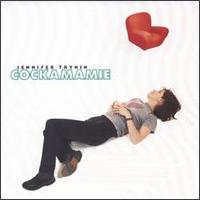
Jennifer Trynin
Cockamamie (Squint)
by Marc Hirsh

Jennifer Trynin
Cockamamie (Squint)
by Marc Hirsh
originally published in the Rice Thresher, February 24, 1995
If they had their way, the promotions department of Squint Records would have you know that Jennifer Trynin is bad, but in a good way. To hear them tell it, it's PJ Harvey all over again, and gasp! She even says a really bad word in the very first song. How Liz Phair-esque!
If I had my way, I'd tell you that the above is a highly inaccurate description of an singer who shares with Harvey and Phair only a pretty impressive songwriting capability and a unique and interesting voice. What Squint doesn't seem to want you to know is that beneath the sonic mayhem of her debut Cockamamie lies a collection of good-to-superb pop songs.
It helps that Trynin's got a thoroughly appealing voice, sort of a cross between Meryn Cadell and Maggie Estep (who don't sell as much as Harvey or Phair, so of course Squint couldn't use them as comparisons) or a female Matthew Sweet (whose being a male creates its own comparison problems). Her delivery is similar to Sweet or, better, Aimee Mann.
Mann seems to be a touchstone for Trynin. Both are from Boston, both share drummer Milt Sutton (who toured with Mann) and both have songs called "Everything Is Different Now." As if to show her approval, Mann herself pops up to sing backup on "Snow," one of the album's best songs.
The album's other standouts are similar, in that they don't reach too far into the realm of noise and madness. "One Year Down" is a wonderful song that conveys its sense of desperation and cynicism without losing its buoyancy. "Do It Alone" finds Trynin by herself, accompanied only by her electric guitar, and it ends the album on a high note, despite its less-than-rosy outlook.
Which isn't to say that Trynin doesn't try hard to be angry. The opener, "Happier" (the one with the naughty language), is a frenzied rocker, "All This Could Be Yours" is an effective punk rant and "Everything Is Different Now" takes a slow funk rhythm and distorts it until it is unrecognizably cynical.
The difference between these and the lighter tunes is that these don't seem as successful, they sound more forced. Even the slow Neil Young-ish dirge of "Too Bad You're Such A Loser" can't support its own weight and eventually becomes that bane of the independent record label, a pop song.
The question is, which was struggling to break through? Was it the popster in Trynin rebelling against the indie image of the tough, angry Lady Rocker? Or maybe it was the distortion- and volume-mad punkette disgusted at her own tendencies towards melodicism and accessibility? Either way, Jennifer Trynin can duke it out with herself in public and watching will definitely be worth the price of admission. Though I'm personally hoping for the former.